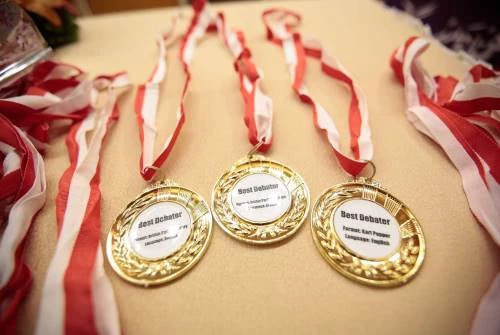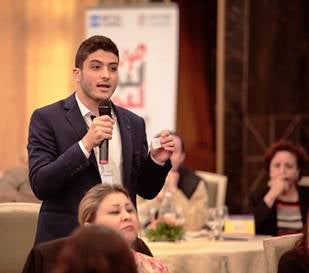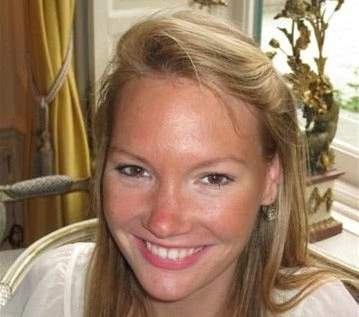
“ Everybody gives up a little freedom for a temporary period of time ,” argued one member of the winning debate team, 17-year-old Lina Boufla, who was supporting the motion. This could, for example, include a curfew—not going out at night, she explained. “We need it in Tunisia, we are dying from terrorism,” she s’`aid.
Others supporting the motion echoed Boufla. “ People won't care about freedom if they aren't safe ,” one of them said.
The argument by opponents of the motion was, “No solution was given to eradicate terrorism; limiting freedom cannot be the solution .” A debater made a comparison to the Islamic State (IS): “ Iraq is an example of how limiting freedoms in order to fight terrorism is not the solution . The birth of ISIL was the result.”
Seventeen year-old Boufla, however, continued to argue the opposite—that allowing the government to limit citizens’ freedom, as a short-term solution only, was something civil society needed to back for now. To her, it was necessary for addressing extremism at its roots, where youth were key. “We need to listen to each other,” she concluded.
These different opinions were voiced during a three-day debating competition hosted by Young Arab Voices, during which 80 young leaders debated topics related to extremism, including censorship and religious schools. The World Bank and British Council organised the competition. “ The voice of young people needs to be heard ,” said the British Council’s Tunisia director, Nigel Bellingham.

Listening to other people’s views matters
But debating is about more than voicing one opinion: Boufla explained that harmony was the secret of her team’s success, “We complement and support each other.” She has been part of a debate club for three years. It was something different—something she had never experienced before. “It changed my life,” she said. “Words matter,” she said, and described how when she reads a text or a statement now, she thinks about it more critically before accepting it.
“These people will be our leaders of tomorrow,” argued Moez Dhahri, a teacher and debating trainer who was part of the event’s motions committee. The motions were chosen from challenging, relevant topics, and varied from addressing the conflicts in Syria or Libya to domestic and local issues relating to, for example, Tunisia’s education system or local elections. Dhahri is himself from southern Tunisia, the more marginalised area of the country where, he argued, the need for debate schools is even greater because of the lack of other things for young people to do. His goal is to establish one debate club in each school.
Program aims to involve 1 million young people in debating
In addition, the aim of the debate program is to reach 1 million debaters in MENA . Since its start in 2011, the debating program has reached a total of 100,000 young people in MENA . In 2015, 380 Young Arab Voices debates were held, involving 4,000 debaters and 130 training sessions. The concept is built on the assumption that debating and critical thinking are central to strengthening people’s resilience to radicalisation and extremist narratives.
So how is critical thinking taught? According to 25 year-old Young Arab Voices Tunisia trainer, Nesrine Ben Brahim, it’s about putting a person in a position they don’t feel comfortable in—in someone else’s shoes. “It makes you think,” she said, “And it disciplines you to listen to others.”
To Ben Brahim, dialogue and debates will increase understanding for other people and make young people more tolerant. “ Debating is not primarily about expressing your own views but about understanding others ,” she said. “And that’s much more challenging.” In her opinion it’s a constructive and long-term way to fight extremism. She can only take her personal experience as an example. Debating has had a huge impact on her life, which contributed to her decision to finish a Masters’ degree in public policy.
Seventeen-year-old Yacine Montacer agrees: “ Debating helps you become creative .” He established a debate club two years ago at his high school, the Gabes Pioneer School in Tunis. He argued that debating had not only made him a better public speaker, but a leader. “It has also taught me to think for myself.”
The debate show has proven popular among Montacer’s 600 or so schoolmates. Weekly sessions have an attendance of about 20 students divided into two groups to debate topics picked from international politics or domestic issues. Participants need to research the topics, improving the student’s research skills. “It also teaches the students to think for themselves and think freely,” said Montacer. “There is no other environment that provides you with this type of space in the Tunisian educational system.”


Join the Conversation